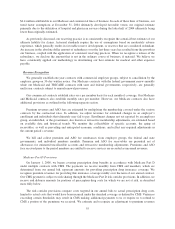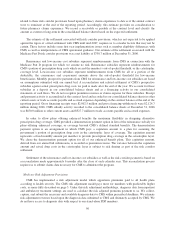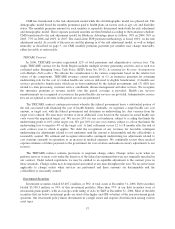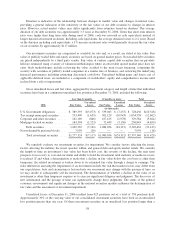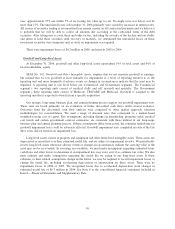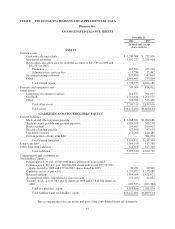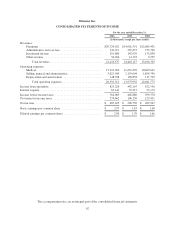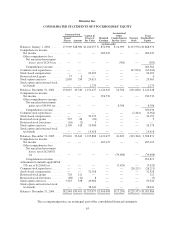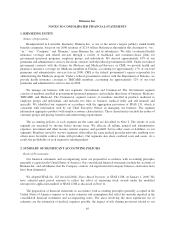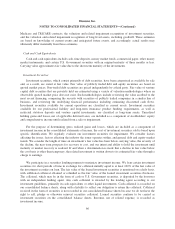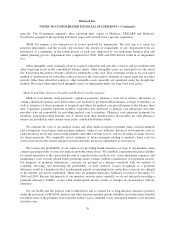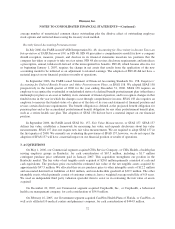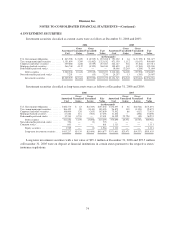Humana 2006 Annual Report Download - page 77
Download and view the complete annual report
Please find page 77 of the 2006 Humana annual report below. You can navigate through the pages in the report by either clicking on the pages listed below, or by using the keyword search tool below to find specific information within the annual report.Humana Inc.
NOTES TO CONSOLIDATED FINANCIAL STATEMENTS
1. REPORTING ENTITY
Nature of Operations
Headquartered in Louisville, Kentucky, Humana Inc. is one of the nation’s largest publicly traded health
benefits companies, based on our 2006 revenues of $21.4 billion. References throughout this document to “we,”
“us,” “our,” “Company,” and “Humana,” mean Humana Inc. and its subsidiaries. We offer coordinated health
insurance coverage and related services through a variety of traditional and consumer-choice plans for
government-sponsored programs, employer groups, and individuals. We derived approximately 67% of our
premiums and administrative services fees from contracts with the federal government in 2006. Under our federal
government contracts with the Centers for Medicare and Medicaid Services, or CMS, we provide health and
pharmacy insurance coverage for Medicare members in Florida, accounting for approximately 17% of our total
premiums and administrative services fees in 2006. CMS is the federal government’s agency responsible for
administering the Medicare program. Under a federal government contract with the Department of Defense, we
provide health insurance coverage to TRICARE members, accounting for approximately 12% of our total
premiums and administrative services fees in 2006.
We manage our business with two segments: Government and Commercial. The Government segment
consists of members enrolled in government-sponsored programs, and includes three lines of business: Medicare,
TRICARE, and Medicaid. The Commercial segment consists of members enrolled in products marketed to
employer groups and individuals, and includes two lines of business: medical (fully and self insured) and
specialty. We identified our segments in accordance with the aggregation provisions of SFAS 131, which is
consistent with information used by our Chief Executive Officer in managing our business. The segment
information aggregates products with similar economic characteristics. These characteristics include the nature of
customer groups and pricing, benefits and underwriting requirements.
The accounting policies of each segment are the same and are described in Note 2. The results of each
segment are measured by income before income taxes. We allocate all selling, general and administrative
expenses, investment and other income, interest expense, and goodwill, but no other assets or liabilities, to our
segments. Members served by our two segments often utilize the same medical provider networks, enabling us to
obtain more favorable contract terms with providers. Our segments also share overhead costs and assets. As a
result, the profitability of each segment is interdependent.
2. SUMMARY OF SIGNIFICANT ACCOUNTING POLICIES
Basis of Presentation
Our financial statements and accompanying notes are prepared in accordance with accounting principles
generally accepted in the United States of America. Our consolidated financial statements include the accounts of
Humana Inc. and subsidiaries that the Company controls. All significant intercompany balances and transactions
have been eliminated.
We adopted SFAS No. 123 (revised 2004), Share-Based Payment, or SFAS 123R, on January 1, 2006. We
have adjusted prior period amounts to reflect the effect of expensing stock awards under the modified
retrospective application method of SFAS 123R as discussed in Note 11.
The preparation of financial statements in accordance with accounting principles generally accepted in the
United States of America requires us to make estimates and assumptions that affect the amounts reported in the
consolidated financial statements and accompanying notes. The areas involving the most significant use of
estimates are the estimation of medical expenses payable, the impact of risk sharing provisions related to our
65


